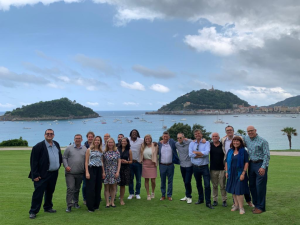By Jean-Claude Piris
Article published in Financial Times (November 3, 2011)
If, as William Hague, Britain’s foreign secretary, suggests, the eurozone is a burning house with no exits, the first task is to put out the fire. But this is not enough. The house must be repaired, albeit on existing foundations, because, to be clear, it is the entire European Union that is becoming less efficient and less relevant. The Lisbon treaty did not deliver what was needed.
This is a painful admission. I laboured long and hard to produce a treaty fit for a union of 27 members. The EU is ponderous and unable to make rapid decisions. It finds it hard to finalise and enforce rules to govern the internal market, the Schengen agreement, or co-operating on defence. The commission is weak. The one-size-must-fit-all decision-making system does not suit a heterogeneous union. Rather than responding swiftly and decisively to events, the EU is more likely to produce a mouse. Irrelevance looms.
It is time to admit that the enlargement of the EU from 15 to 27 members was too rapid. Europe’s citizens no longer understand the purpose of the EU, its political aims and what its geographical borders will be. They are lost. For all its increased powers, granted through treaties since Maastricht, the European Parliament, the supposed repository of democratic legitimacy in Europe, is a relative failure.
I have to speak harsh truths: the very legitimacy of the EU is at stake. Winning back public opinion, while fighting a tide of populism, is challenging at a time when painful decisions have to be taken to face the euro crisis. But the EU cannot afford to be cast as a symbol of austerity. It must offer a broader political project, capable of giving hope of a better future.
Is this feasible? Given the fundamental disagreements among the 27 members, a major revision of the EU treaties by the 27 looks out of the question in the short and medium term. Yet to continue on the current path is fraught with danger. It runs the risk of a union becoming more enfeebled, even of splitting at the next crisis.
It is just possible to imagine a centralised monetary union with decentralised budgetary and economic policies. But the chances of a continuation of the status quo are slim. To have any chance, members of the eurozone should at least fully exploit the powers offered by Article 136 TFEU (Treaty on the Functioning of the EU). Even then, there is the politically tricky issue of how to maintain democratic control of decision-making within the present institutional framework.
Far better would be to consider a two-speed EU, which would include an avant-garde group, probably based on the current 17 members of the euro area. This could take a “softer” or a “bolder” form. Whatever the case, closer co-operation should primarily cover economic and budgetary policies. But it could also extend to other areas of vital interest to citizens: protection of the environment, judicial co-operation in criminal and civil matters, new political rights for individuals and better organisation of immigration.
Under the softer option, willing euro members would fully exploit clauses in the treaties to develop more enhanced co-operation. When working together within the EU framework, members would have to respect the decisions taken by a parliament and a commission in which nationals of all 27 member states participate. Still, even if participating governments work closely with their national parliaments, democratic legitimacy and proper scrutiny of their decisions might still be lacking.
Under the bolder option, willing euro members would conclude an additional treaty compatible with international and EU law. This would contain additional obligations for them, as well as a definition of the organs and rules that would govern their supplementary co- operation in the best way possible.
There could be a parliamentary organ representing national parliaments and a small administrative authority distinct from the commission. Under the control of the EU court of justice, participating states would continue to be bound by EU law, including on the single market. They would also be obliged not to harm the rights and interests of other EU members. They would be a temporary group, open to the others and ready to help them to join when willing and able.
The present EU set-up is no longer tenable. Trying to solve the problems within the current rules and with the participation of all member states appears impossible. UK prime minister David Cameron appears to have recognised as much in urging the eurozone to take the steps to make the single currency work. Creating a temporary avant-garde group, which is already imposing itself, could stem the EU’s crisis. It would also pave the way for greater democratic legitimacy, without changing the EU’s essential characteristics. The solutions are available. What is lacking is the political will.
The writer was legal counsel of the European Council. His next book is ‘The Future of Europe’


